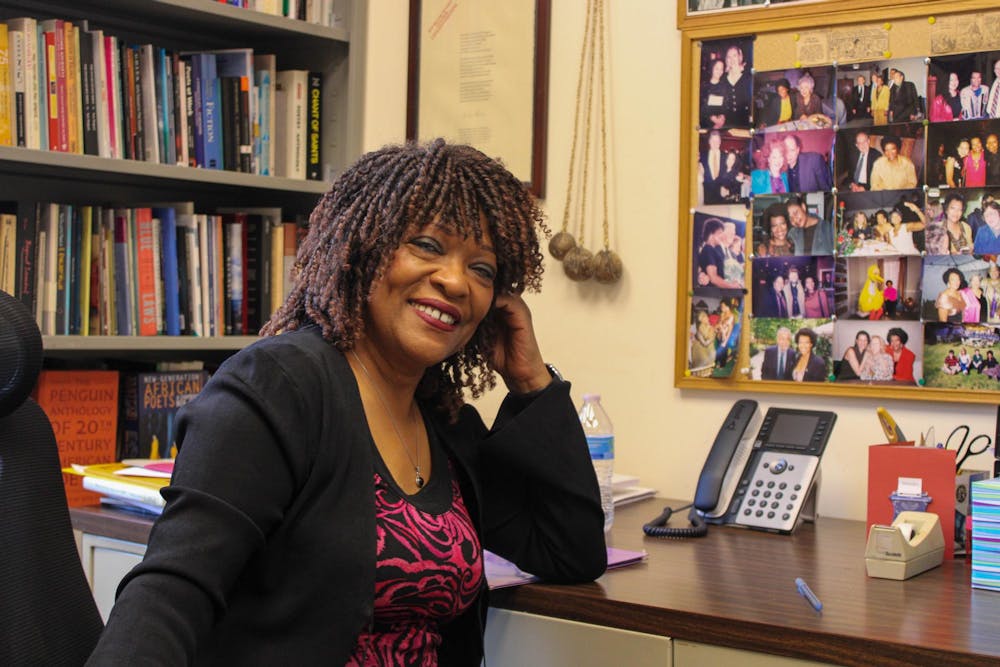Rita Dove — celebrated poet and Henry Hoyns Professor of Creative Writing — has taught at the University since 1989, helping to shape new generations of writers at the undergraduate and graduate levels. Over the course of her dazzling career, she has found inspiration in stories of marginalized people often rendered invisible.
“As an African American woman, with that double marginalization, I grew up always knowing that I was going to be ignored…that sense of, I can see you, but you won't see me, and I don’t understand that, but I’m gonna report on this,” Dove said.
This insight into marginalized perspectives imbues Dove’s writing and has led her to look beyond the stories in history books.
“You have on your neighborhood street all sorts of examples of heroism, bravery, even cowardice and evil … and then none of that, of course, gets into the history books,” Dove said.
Dove has told these stories through the medium of poetry for over 40 years to much acclaim. She received a Pulitzer Prize for her collection “Thomas and Beulah” in 1987, served as United States Poet Laureate from 1993 to 1995 and earned The National Book Foundation’s Medal for Distinguished Contribution to American Letters in 2023 — a lifetime achievement recognition. These are only a few of her countless accomplishments.
Dove grew up in Akron, Ohio and graduated with a Bachelor of Arts in English from Miami University in 1973. She studied at the University of Tübingen in Germany as a Fulbright Fellow from 1974 to 1975 and received her Master of Fine Arts from the Iowa Writers’ Workshop at the University of Iowa in 1977.
She went on to teach creative writing at Arizona State University from 1981 to 1989, until she was recruited to teach at U.Va. by former English prof. Charles Rowell — founder of Callaloo, a literary journal which publishes creative and critical work by writers and artists of African descent. Dove said she felt apprehensive when Rowell first invited her to come to Virginia — she was wary of the South — but she had been published in Callaloo and respected Rowell, so she accepted his invitation. She said this first visit to the University upended her preconceptions.
“I fell in love with the minds that I found here, both with the students and with the professors,” Dove said. “Everyone kept saying, Virginia is not the South, Virginia is Virginia, it's a different South. It is a very strange and conflicted South, and that I found exceedingly interesting … It has become my home.”
Dove said she found herself interrogating Virginia’s “conflicted South” in her poetry as she settled into her position at the University, but not necessarily in the ways readers anticipated.
“When I first came to Virginia, I think many people were expecting me to immediately begin writing about Thomas Jefferson,” Dove said. “Writing about Virginia, it takes a while for things to brew. I knew that I would, at some point it was going to happen, because I felt that Thomas Jefferson … was an emblem of a nation that was torn down the middle. It took a while.”
Dove referred to a “cameo” appearance by Jefferson in one of her books, but said she ultimately found an entry point to an exploration of Virginia not focused on the University’s founder. Instead, she wrote about the story of Henry Martin, a formerly enslaved man who acted as the Rotunda bell ringer in the late 1800s.
“This is a person who's known, but only by a few people, and he was in everybody's life every single day at the University without anyone taking notice,” Dove said. “He really began to speak. He speaks in the poem, but he really began to speak. He wrote that poem. I'm really proud that I was able to do that.”
She presented her poem on Martin, “Bellringer,” at the University’s bicentennial celebration on the Lawn in Oct. 2017.
Creative openness and curiosity helped Dove to find inspiration in Martin’s story, and it is these qualities that shape her approach to teaching. In her intimate, workshop-style writing courses, she said she encourages students to respond to daily experiences in their work.
“I'm really interested, both for the graduates and the undergraduates, that they keep writing, and that they do not necessarily write toward a project … concentrating on that and shutting out everything else that's happening in their lives,” Dove said. “Instead [I want them] to be able to admit into themselves all the little surprises in life, and write there too.”
On top of teaching, Dove is now working on a memoir, a number of individual poems and a poem to accompany Samuel Barber’s “Adagio for Strings” as part of a Cincinnati Symphony Orchestra program spotlighting African American artists and composers in 2026.
An emphasis on unrecorded stories continues to inform Dove’s creative practice and the content of her courses. She said she hopes her students recognize the value of people, places and things which may go unnoticed by others.
“I think that what's important about retrieving these unsung voices… is that it reminds us how important every single thing is,” Dove said. “By opening the interior life of someone who you have stereotyped … hopefully you'll be less likely to hate that person or to fear that thing, or to speak of divisions.”







